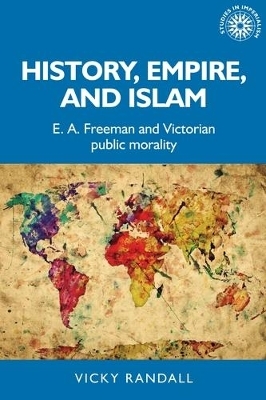
History, Empire, and Islam
E. A. Freeman and Victorian Public Morality
Seiten
2020
Manchester University Press (Verlag)
978-1-5261-3581-0 (ISBN)
Manchester University Press (Verlag)
978-1-5261-3581-0 (ISBN)
This book seeks to recover E. A. Freeman's reputation as a leading Victorian historian and public moralist. Often dismissed as a panegyrist to English progress and a virulent racist, this study reveals the nuances of Freeman's understanding of world history, and draws out the connections on history, Islam, and empire.
This book offers the first comprehensive treatment of the historian and public moralist E. A. Freeman since the publication of W. R. W. Stephens’ Life and Letters of Edward A. Freeman (1895). While Freeman is often viewed by modern scholars as a panegyrist to English progress and a proponent of Aryan racial theory, this study suggests that his world-view was more complicated than it appears. Revisiting Freeman’s most important historical works, this book positions Thomas Arnold as a significant influence on Freeman’s view of world-historical development. Conceptualising the past as cyclical rather than unilinear, and defining race in terms of culture, rather than biology, Freeman’s narratives were pervaded by anxieties about recapitulation. Ultimately, this study shows that Freeman’s scheme of universal history was based on the idea of conflict between Euro-Christendom and the Judeo-Islamic Orient, and this shaped his engagement with contemporary issues. -- .
This book offers the first comprehensive treatment of the historian and public moralist E. A. Freeman since the publication of W. R. W. Stephens’ Life and Letters of Edward A. Freeman (1895). While Freeman is often viewed by modern scholars as a panegyrist to English progress and a proponent of Aryan racial theory, this study suggests that his world-view was more complicated than it appears. Revisiting Freeman’s most important historical works, this book positions Thomas Arnold as a significant influence on Freeman’s view of world-historical development. Conceptualising the past as cyclical rather than unilinear, and defining race in terms of culture, rather than biology, Freeman’s narratives were pervaded by anxieties about recapitulation. Ultimately, this study shows that Freeman’s scheme of universal history was based on the idea of conflict between Euro-Christendom and the Judeo-Islamic Orient, and this shaped his engagement with contemporary issues. -- .
Vicky Randall is Senior Lecturer in History at the University of Gloucestershire -- .
Introduction: ‘History is past politics, politics is present history’
Part I: The West
1 The Norman Conquest (1867–79)
2 The Aryan race and Comparative Politics (1873)
3 ‘I am no lover of Empire’: the critique of British expansionism
Part II: The East
4 Islam and Orientalism in the History and Conquests of the Saracens (1856)
5 The Great Eastern Crisis and the ‘Oriental Conspiracy’
6 Fear and guilt in the Ottoman Power in Europe (1877)
Conclusion
Appendix
References
Index -- .
| Erscheinungsdatum | 10.05.2021 |
|---|---|
| Reihe/Serie | Studies in Imperialism |
| Verlagsort | Manchester |
| Sprache | englisch |
| Maße | 156 x 234 mm |
| Gewicht | 503 g |
| Themenwelt | Geisteswissenschaften ► Geschichte ► Allgemeines / Lexika |
| Geschichte ► Teilgebiete der Geschichte ► Kulturgeschichte | |
| Geschichte ► Teilgebiete der Geschichte ► Wirtschaftsgeschichte | |
| ISBN-10 | 1-5261-3581-7 / 1526135817 |
| ISBN-13 | 978-1-5261-3581-0 / 9781526135810 |
| Zustand | Neuware |
| Informationen gemäß Produktsicherheitsverordnung (GPSR) | |
| Haben Sie eine Frage zum Produkt? |
Mehr entdecken
aus dem Bereich
aus dem Bereich
der stille Abschied vom bäuerlichen Leben in Deutschland
Buch | Hardcover (2023)
C.H.Beck (Verlag)
23,00 €
vom Mittelalter bis zur Gegenwart
Buch | Softcover (2024)
C.H.Beck (Verlag)
12,00 €


